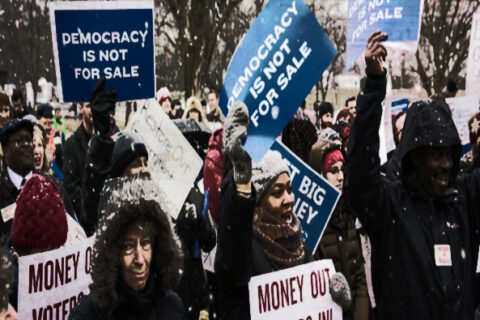Historically, the traditional South has opposed the spread of democracy and the transformation of our society at all levels of government, from a limited and hierarchical republic to a more expansive and egalitarian democracy. To Post-Modern ears, a statement such as this amounts to self-incrimidation as a recalcitrant foe of human progress.
Indeed, Southern history provides Post-Modern egalitarian democrats (to be extremely redundant) with abundant evidence to condemn our civilization in the harshest terms. Truthfully, the traditional South mostly opposed the expansion of the franchise to White men without property, to free people of color and later to women. More recently, Southern states have opposed voting rights for unregistered citizens, illegal aliens and felons – all to the outrage of Progressive non-Southern states, which have consistently fought to expand voting rights.
In the nineteenth century, an age in which greater diversity of political philosophy was permitted, learned and scholarly critiques of democracy did abound. Celebrated Southern intellectuals such as Calhoun, De Bow and Fitzhugh participated in the public debates of the antebellum era as representatives of a distinct and unflinchingly anti-egalitarian branch of Anglo-American political philosophy. That tradition has survived in a mostly marginalized and diluted form since the days of I’ll take My Stand: The South and the Agrarian Tradition. Unfortunately, the cultural and intellectual forces which sidelined all learned non-democratic voices on the Right have done their work too well.
This is why it is refreshing when a new voice is heard which takes up a critique of democracy from a non-liberal perspective. Belgian historian, Christophe Buffin de Chosal, in his The End of Democracy (Tumblar House, 2017) dares to do do just that. He points to the many serious threats to Western society today, not as challenges for democratic government to solve, but as problems caused by an increasingly intrusive and burdensome democratic regime. He writes:
The democratic state is not accidentally totalitarian; it is necessarily totalitarian, for the parties which govern in a democracy can only accede to power and remain there by ever promising and offering more benefits to the bulk of the population. It is inevitably the party which offers the most benefits to the greatest number that has the greatest chance of arriving at and staying in power. Now, in order to be able to offer these benefits to the population, thr state must ever become more centralized and more interventionist. It must augment its regulatory powers and thereby reduce individual liberties. It must increase the population’s dependence on it, offering ever more services and thus increasing its tax burden. The democratic state is the natural enemy of individual freedom, and of private property which is its guarantee.
This Rightist critique of democracy is one which transends factional divisions, especially from our Southern perspective. It sounds much like the warnings of antebellum intellectuals about the loss of liberties and the destruction of property under a consolidated, democratic regime. It also takes us close to an identitarian position, which previously was a uniquely Southern concern. We here in Dixie can take heart that across the Atlantic (on the Continent, no less) our old concerns about the imposition of a totalitarian and destructive form of government are being given voice once again.


